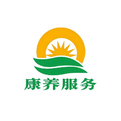Ginseng is well-known, and perhaps what friends are most interested in is whether ginseng can run away; first of all, it is certain that ginseng does not become a spirit and does not run away! Why is there a rumor that ginseng can run away?It is because ginseng, as a perennial herbaceous plant, has a withering dormancy period, which some people refer to as a false death.When you see a ginseng plant, after a few days, you may not see any trace of it.The next year, stronger ginseng seedlings grow in the same place, and the rumor spreads that ginseng pretends to be dead and runs away.
Effects of Ginseng
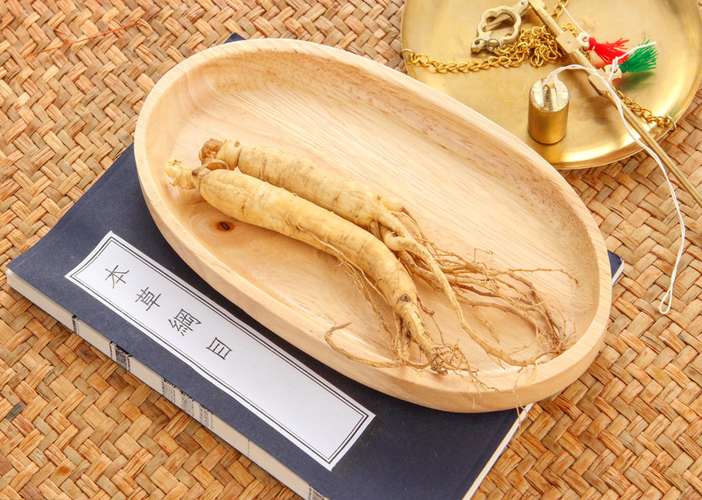
1. Ginseng has a sweet and slightly bitter taste, is slightly warm in nature, and belongs to the Spleen (Pi), Lung (Fei), Heart (Xin), and Kidney (Shen) meridians. It tonifies Qi and moistens the body, with a tendency to ascend more than descend; it has the effects of tonifying Qi and stabilizing the collapse, strengthening the Spleen and benefiting the Lung, calming the mind and enhancing intelligence, nourishing blood and generating fluids.2. Ginseng is indicated for major illnesses, chronic diseases, blood loss, and fluid depletion leading to a desire for Qi collapse, fatigue, and weak pulse; insufficient Spleen Qi leading to poor appetite and fatigue, vomiting, and diarrhea; weak Lung Qi leading to shortness of breath, wheezing, and weak cough; deficient Heart Qi leading to insomnia, vivid dreams, palpitations, forgetfulness, and excessive sweating; fluid deficiency leading to thirst and diabetes; blood deficiency leading to sallow complexion and dizziness; Kidney Yang deficiency leading to impotence, frequent urination, and Qi deficiency with external pathogens.3. It greatly tonifies Yuan Qi, stabilizes collapse, generates fluids, and calms the spirit. It treats fatigue from overwork, poor appetite, fatigue, gastroesophageal reflux, loose stools, weak cough and wheezing, spontaneous sweating, palpitations, forgetfulness, dizziness, headache, impotence, frequent urination, diabetes, women’s menorrhagia, children’s chronic fright, and all conditions of Qi, blood, and fluid deficiency.
Health Benefits of Ginseng
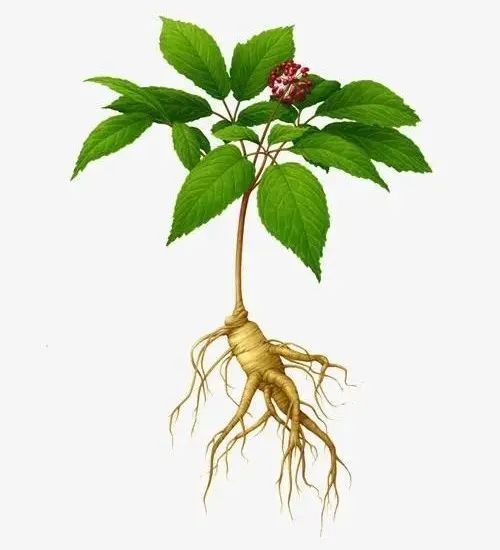
1. Regulates the central nervous systemGinseng can regulate the central nervous system, improving the balance between excitation and inhibition in the brain; it can enhance both mental and physical labor capacity, improve work efficiency, and has anti-fatigue effects.2. Promotes the brain’s utilization of energy substancesIt can enhance learning and memory abilities. The effective components in ginseng that enhance learning and memory are ginsenosides, particularly ginsenoside Rb1 and Rg1, which have a good impact on learning and memory functions.3. Improves heart functionGinseng can increase myocardial contractility, slow the heart rate, and increase cardiac output and coronary blood flow, which can counteract myocardial ischemia and arrhythmias. It has a significant effect on heart function, cardiovascular health, and blood flow. Ginseng has a notable anti-hypoxia effect, and its preparations can effectively counteract sinus bradycardia. Ginsenosides can accelerate lipid metabolism and significantly lower high cholesterol levels. Low doses of ginseng can mildly raise blood pressure in anesthetized animals, while high doses can lower blood pressure. Different ginseng preparations enhance the function of isolated frog hearts and the hearts of rabbits, cats, and dogs, and can improve myocardial weakness during ventricular fibrillation.4. Blood sugar-lowering effectsGinseng contains ginsenosides and ginseng polysaccharides. In particular, ginsenoside Rb2 has a significant blood sugar-lowering effect, and ginseng polysaccharides (or glycopeptides) are another class of blood sugar-lowering components in ginseng.5. Enhances the body’s immune functionGinsenosides and ginseng polysaccharides are the active components in ginseng that regulate immune function, enhancing immunity not only in healthy individuals but also in those with weakened immune systems. Ginseng polysaccharides are purified high-molecular acidic polysaccharides from ginseng and act as immune enhancers. Animal experiments and clinical trials have confirmed that they can significantly enhance human immunity, have certain efficacy against malignant tumors, prolong patient survival time, improve cellular immune function, and reduce the toxic side effects of radiotherapy, accelerating the repair of damaged tissues. Clinical observations have confirmed that ginseng polysaccharides have a significant leukocyte-increasing effect, and when used concurrently with radiotherapy and chemotherapy, they can reduce the toxic side effects of radiotherapy and prevent leukopenia, allowing patients to complete treatment smoothly. There are no side effects during the use of ginseng polysaccharides, proving that this medicine is safe and reliable.6. Increases resistance to harmful stimuli, enhancing the body’s stress response and adaptabilityGinseng contains ginsenosides, which can enhance anti-stress effects. It can improve the ability to withstand hypoxia, high temperatures, and low temperatures.7. Anti-tumor effectsGinsenosides, ginseng polysaccharides, ginsenoside olefins, ginsenoside alkynes, and volatile oils in ginseng have certain inhibitory effects on tumors, but the mechanisms are quite complex.8. Antioxidant effectsGinseng contains various antioxidant substances, including ginsenosides, ginseng polyacetylenes, and ginsenoside diols. These compounds have anti-lipid peroxidation effects, which are the basis for anti-aging effects. In addition to anti-aging effects, they also regulate physiological functions such as nerve, endocrine, immune functions, and material metabolism. Furthermore, ginseng has various effects such as antiviral, anti-shock, and weight loss. Although ginseng is a highly valued supplement, it is not suitable for everyone. The protein factors in ginseng can inhibit fat decomposition, exacerbating lipid deposition in blood vessel walls, so individuals with coronary heart disease, hypertension, cerebrovascular sclerosis, and diabetes should use ginseng with caution. Increased blood viscosity can hinder blood circulation, which in Traditional Chinese Medicine (TCM) is referred to as blood stasis. Ginseng promotes red blood cell growth, and an increase in red blood cells can further raise blood viscosity.
Consumption and Suitable Groups for Ginseng

1. Whether it is red ginseng or sun-dried ginseng, it should be consumed gradually and not in excess.2. Attention should be paid to seasonal changes; generally, it is better to consume in autumn and winter when the weather is cool; while in summer, when the weather is hot, it is not advisable to consume.3. The following groups should avoid consuming ginseng:Healthy individuals:Healthy individuals should focus on diet and exercise as good strategies for strengthening the body. Excessive consumption of ginseng is not beneficial to health, especially for children and vigorous young adults, who should not blindly consume ginseng.Individuals with a purple and dark tongue:In TCM, a purple and dark tongue indicates Qi and blood stagnation. Consuming ginseng may worsen Qi and blood stagnation, leading to symptoms such as restlessness and heat in the palms and soles.Individuals with a flushed face:Clinically, individuals with a flushed face often exhibit excitement and high blood pressure; consuming ginseng may lead to increased blood pressure, dizziness, insomnia, and vivid dreams.Individuals with a thick yellow tongue coating:Healthy individuals typically have a thin white and moist tongue coating; a yellow coating indicates poor digestion or inflammation. Consuming ginseng at this time may lead to loss of appetite, abdominal bloating, and constipation.Individuals with a distended abdomen:This group often experiences increased appetite after consuming ginseng, leading to rapid weight gain, sluggishness, and feelings of heaviness.Individuals with fever:Fever should first be investigated for its cause; one should not blindly supplement due to a weak body. Individuals with fever from colds or inflammation may worsen their condition by consuming ginseng.Individuals with chest tightness and abdominal distension:This group often experiences symptoms of chest tightness and abdominal distension after consuming ginseng.Individuals with sores and abscesses:Those suffering from carbuncles, scabies, and sore throat must have internal heat and toxins; consuming ginseng may lead to severe consequences such as exacerbation of sores and prolonged healing.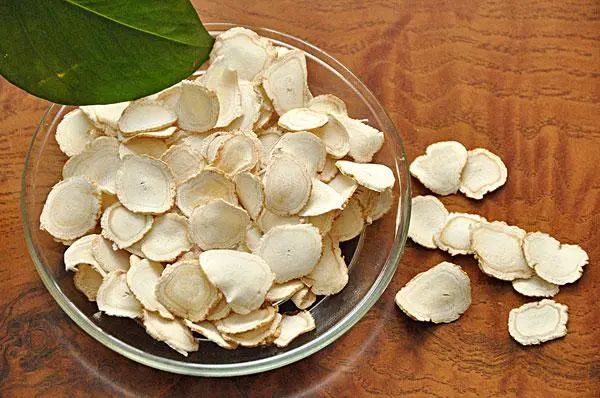 Take 1-3 grams of ginseng slices or segments daily, dry them, and grind them into a fine powder, which can be taken with warm water. If using ginseng powder, it can be encapsulated for oral consumption, divided into two doses daily. Grinding and swallowing is generally based on mountain ginseng and red ginseng. This method is suitable for office workers, as it is very convenient to consume.However, this method of consumption requires caution for patients with poor gastrointestinal digestion, as ginseng powder, once ingested, dissolves into molecular form for absorption, which may not be complete. It is recommended to use decoction instead, which is described in detail below. This method is practical, convenient, and allows for more comprehensive absorption of ginseng.Use ginseng slices or ginseng roots. The daily dosage is 1-3 grams, placed in a porcelain or glass cup, pour in boiling water, cover, and wait a moment. After about 10 minutes, it can be consumed. When the flavor is gone and the water tastes faint, the ginseng residue can be chewed or discarded.For ginseng tea, it is advisable to use sun-dried ginseng and American ginseng, as red ginseng and wild mountain ginseng do not steep well in boiling water and should be decocted.Ginseng Decoction Method:Slice the ginseng and soak it in 200-400 milliliters of cold water for about 1 hour, then place it in a clay pot, cover it, and bring it to a boil. After boiling, simmer on low heat for about 1 hour until about 100 milliliters of decoction is obtained. Consume 3/4 of the decoction, leaving 1/4 for further boiling with added water. This method can be repeated for 2-3 cycles, reducing the amount of water and boiling time as the medicinal liquid gradually becomes diluted. It can be taken 2-3 times a day. The remaining residue can also be chewed or discarded.
Take 1-3 grams of ginseng slices or segments daily, dry them, and grind them into a fine powder, which can be taken with warm water. If using ginseng powder, it can be encapsulated for oral consumption, divided into two doses daily. Grinding and swallowing is generally based on mountain ginseng and red ginseng. This method is suitable for office workers, as it is very convenient to consume.However, this method of consumption requires caution for patients with poor gastrointestinal digestion, as ginseng powder, once ingested, dissolves into molecular form for absorption, which may not be complete. It is recommended to use decoction instead, which is described in detail below. This method is practical, convenient, and allows for more comprehensive absorption of ginseng.Use ginseng slices or ginseng roots. The daily dosage is 1-3 grams, placed in a porcelain or glass cup, pour in boiling water, cover, and wait a moment. After about 10 minutes, it can be consumed. When the flavor is gone and the water tastes faint, the ginseng residue can be chewed or discarded.For ginseng tea, it is advisable to use sun-dried ginseng and American ginseng, as red ginseng and wild mountain ginseng do not steep well in boiling water and should be decocted.Ginseng Decoction Method:Slice the ginseng and soak it in 200-400 milliliters of cold water for about 1 hour, then place it in a clay pot, cover it, and bring it to a boil. After boiling, simmer on low heat for about 1 hour until about 100 milliliters of decoction is obtained. Consume 3/4 of the decoction, leaving 1/4 for further boiling with added water. This method can be repeated for 2-3 cycles, reducing the amount of water and boiling time as the medicinal liquid gradually becomes diluted. It can be taken 2-3 times a day. The remaining residue can also be chewed or discarded.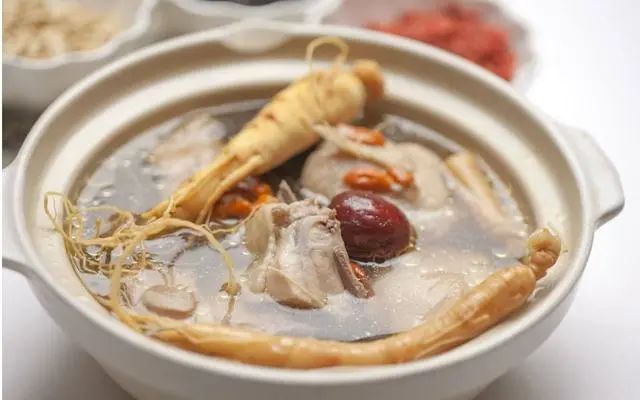 Note: Do not frequently lift the lid during the decoction process.The decoction method is suitable for all varieties of ginseng and is the most commonly used method. The main components of ginseng can dissolve in water, especially in boiling water, and can also dissolve in high-concentration white liquor. Therefore, from an absorption perspective, decoction is the best method for consuming ginseng. Those who regularly consume red ginseng can place the whole root in the decoction for a shorter time, allowing its components to gradually dissolve each day.There are many types of ginseng syrup methodsSingle Ginseng Syrup:This refers to the syrup made from single, double, or triple types of ginseng, such as sun-dried ginseng, red ginseng, and American ginseng.Method:After boiling, adjust to low heat and simmer slowly. Continuously stir with chopsticks to mix well and prevent sticking to the bottom and burning.Ginseng Syrup Method:1-3 times daily, 1-2 spoonfuls each time, taken after meals. It is suitable for supplementation in summer, while small and large compound ginseng syrups are suitable for winter supplementation.Small Compound Ginseng Syrup:This refers to the syrup made by combining several precious Chinese medicinal materials such as deer antler, Cordyceps, and goji berries with the above method.Large Compound Ginseng Syrup:This is generally used for treating specific diseases, typically a large compound of 30-50 types of Chinese herbs. In addition to ginseng, mountain ginseng, red ginseng, sun-dried ginseng, and American ginseng (one or several types) are also needed, along with other herbs like Panax notoginseng, Codonopsis, and Scutellaria.Method:Take 3 grams of ginseng slices, optionally using American ginseng or sun-dried ginseng, soak in cold water, add 10 red dates, 150 grams of glutinous rice, and an appropriate amount of water. Boil, then simmer on low heat until cooked. If you like sweet food, you can add an appropriate amount of rock sugar.Ginseng Wine:Method for Ginseng Wine:Use high-quality whole ginseng and soak it in 40-60 degree white liquor (500 milliliters). It is best to choose high-quality liquor. After soaking for a week, it can be consumed. The longer the soaking time, the stronger the ginseng wine. After drinking, it can be soaked again. It can be divided into 10-20 doses.The effective components of ginseng dissolve better in boiling water than in alcohol.Therefore, from a supplementation perspective, decoction is superior to soaking in alcohol.However, ginseng wine has stronger medicinal properties, as soaking in alcohol can enhance its effects.It is particularly effective for labor-related back pain, osteoarthritis pain, etc., so various ginseng and other medicinal materials are often included in medicinal wines for dispelling wind and dampness, strengthening bones, nourishing the liver and kidneys, and invigorating blood circulation.The effects and efficacy vary depending on the combination of ginseng dishes used. Ginseng dishes are one of the common ways to consume ginseng, allowing one to enjoy the delicious taste of ginseng while enhancing bodily functions and promoting health and beauty.
Note: Do not frequently lift the lid during the decoction process.The decoction method is suitable for all varieties of ginseng and is the most commonly used method. The main components of ginseng can dissolve in water, especially in boiling water, and can also dissolve in high-concentration white liquor. Therefore, from an absorption perspective, decoction is the best method for consuming ginseng. Those who regularly consume red ginseng can place the whole root in the decoction for a shorter time, allowing its components to gradually dissolve each day.There are many types of ginseng syrup methodsSingle Ginseng Syrup:This refers to the syrup made from single, double, or triple types of ginseng, such as sun-dried ginseng, red ginseng, and American ginseng.Method:After boiling, adjust to low heat and simmer slowly. Continuously stir with chopsticks to mix well and prevent sticking to the bottom and burning.Ginseng Syrup Method:1-3 times daily, 1-2 spoonfuls each time, taken after meals. It is suitable for supplementation in summer, while small and large compound ginseng syrups are suitable for winter supplementation.Small Compound Ginseng Syrup:This refers to the syrup made by combining several precious Chinese medicinal materials such as deer antler, Cordyceps, and goji berries with the above method.Large Compound Ginseng Syrup:This is generally used for treating specific diseases, typically a large compound of 30-50 types of Chinese herbs. In addition to ginseng, mountain ginseng, red ginseng, sun-dried ginseng, and American ginseng (one or several types) are also needed, along with other herbs like Panax notoginseng, Codonopsis, and Scutellaria.Method:Take 3 grams of ginseng slices, optionally using American ginseng or sun-dried ginseng, soak in cold water, add 10 red dates, 150 grams of glutinous rice, and an appropriate amount of water. Boil, then simmer on low heat until cooked. If you like sweet food, you can add an appropriate amount of rock sugar.Ginseng Wine:Method for Ginseng Wine:Use high-quality whole ginseng and soak it in 40-60 degree white liquor (500 milliliters). It is best to choose high-quality liquor. After soaking for a week, it can be consumed. The longer the soaking time, the stronger the ginseng wine. After drinking, it can be soaked again. It can be divided into 10-20 doses.The effective components of ginseng dissolve better in boiling water than in alcohol.Therefore, from a supplementation perspective, decoction is superior to soaking in alcohol.However, ginseng wine has stronger medicinal properties, as soaking in alcohol can enhance its effects.It is particularly effective for labor-related back pain, osteoarthritis pain, etc., so various ginseng and other medicinal materials are often included in medicinal wines for dispelling wind and dampness, strengthening bones, nourishing the liver and kidneys, and invigorating blood circulation.The effects and efficacy vary depending on the combination of ginseng dishes used. Ginseng dishes are one of the common ways to consume ginseng, allowing one to enjoy the delicious taste of ginseng while enhancing bodily functions and promoting health and beauty.

